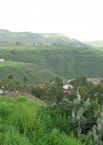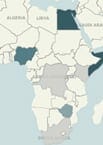Categories
Constitutional Design, Conflict Trends, and Migration in Africa
Jul 18, 2013 | Armed ConflictCCAPSConstitutional Design
The CCAPS program released new research on constitutional design and conflict management, climate change and growth in Ethiopia, governance and conflict in the Sahel, migration and urbanization in Africa, and real-time analysis of conflict trends in Africa.
Constitutional Reform and Violent Conflict: Lessons from Africa, for Africa
CCAPS’ constitutional design and conflict management research explores whether and how constitutional reform could reduce political instability and violence in Africa. In CCAPS Research Brief No. 15, Alan Kuperman outlines seven case studies on African countries, a database of constitutional design in all of Africa, and policy recommendations for foreign aid to promote democracy and good governance. The project recommends promoting gradual reform of Africa’s existing, centralized constitutional designs by counter-balancing them with liberal institutions, which could foster both peace and democracy on the continent.
 Migration, Urbanization, and Political Power in Africa
Migration, Urbanization, and Political Power in Africa
Why ““ given the pace and intensity of urbanization occurring throughout the continent ““ do urban conditions continue to deteriorate and national political programs remain fixed on rural development? Perceptions of ‘rural bias’ and the lack of ‘urban’ improvement programs are largely related to the political calculations of incumbents, the administrative façade of decentralization, and poor, fragmented contests in democratic elections. CCAPS Research Brief No. 14 argues that the poor state of urban cities will continue if migrants, the urban poor, and opposition parties cannot raise support to alter the political calculations of leaders.
 Governance and Conflict in the Sahel’s ‘Ungoverned Space’
Governance and Conflict in the Sahel’s ‘Ungoverned Space’
In their article in Stability: International Journal of Security & Development, Clionadh Raleigh and Caitriona Dowd examine governance and violence rates in the ‘ungoverned’ spaces of the African Sahel. The authors review theories of spatial governance, the geopolitics of the Sahel, and the violent actors operating in the Sahel. They conclude that “a range of actors extensively and effectively governs ‘ungoverned’ spaces….[I]n treating the Sahel as a monolith, analysts and those espousing a ‘crisis’ narrative misrepresent the variation in violence, the politics and governance practices of states, the risks of instability, and the political actors therein.”
 Climate Change, Growth, and Poverty in Ethiopia
Climate Change, Growth, and Poverty in Ethiopia
Because of significant dependence on the agricultural sector for production, employment, and export revenues, Ethiopia is seriously threatened by climate change, which contributes to frequent drought, flooding, and rising average temperatures. In CCAPS Working Paper No. 3, Emerta Aragie examines the impact of climate change on agricultural production to assess the extent to which rainfall explains economic activity. If the current rate of decline in the average annual level of rainfall continues over the medium term, Ethiopia will forgo, on average, more than six percent of each year’s agricultural output.
 Real-Time Analysis of African Political Violence, July 2013
Real-Time Analysis of African Political Violence, July 2013
The July 2013 issue of ACLED’s monthly conflict trends report focuses on the escalation of unrest in Egypt, where June saw massive and diverse protests and riots, followed by the military intervening to oust the country’s first elected President a year after he had taken office. Ongoing violence in DR-Congo’s Katanga Province is also explored, alongside continuing communal violence in Kenya and escalating conflict in Somalia’s cities of Mogadishu and Kismayo. What to expect in the upcoming elections in the two very different contexts of Mali and Zimbabwe is also discussed.


